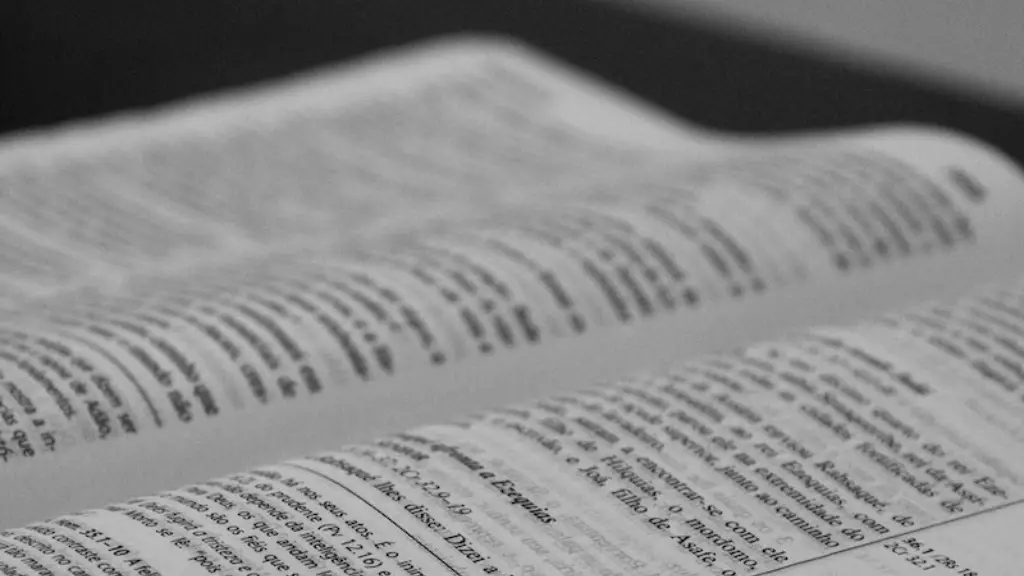The debate over whether poetry should be taught in school has been ongoing for some time. On one side, many educators claim that it is an important part of a child’s education, as it encourages critical thinking, provides a way for students to express themselves, and can help build vocabulary and understanding of language. On the other side, a common criticism is that poetry can be too difficult for some students, particularly if the poems are archaic or unfamiliar. With this in mind, this article will explore both sides of the debate, focusing on evidence from experts and analyzing the potential benefits and drawbacks of teaching poetry in schools.
Research suggests that poetry can be beneficial to students in numerous ways. A study conducted in 2011 found that reading poetry improved cognitive development in children as young as five years old. This means that poetry can be viewed as an important part of a student’s early education, helping them to learn the basics of language and how to think critically. In addition, literary theorists have argued that poetry can help students to gain insight into different cultures and lifestyles. For example, a study conducted in 2008 found that reading poetry increased empathy in readers, allowing them to gain a better understanding of the human experience.
Despite these benefits, some educators are still sceptical about the value of teaching poetry in school. This is mainly due to the fact that poetry can often be perceived as too difficult and abstract for students to fully appreciate. Similarly, many students may find traditional poetry to be dull and unengaging, making them unwilling to engage with the material.
Despite these concerns, there are several strategies that can be employed to make poetry more accessible to students. For example, educators can make use of multimedia to make the material more interactive, or use a less traditional interpretation of poetry, such as spoken word or rap, to appeal to a wider range of students. In addition, educators can also make use of technology, such as e-readers and tablets, to allow students to explore different types of poetry in their own time.
Overall, it is clear that there are both advantages and disadvantages to teaching poetry in school. However, with the right strategies in place, it is possible to make the material more accessible and engaging for students. Whether or not teachers decide to incorporate poetry into their curriculum is ultimately down to personal preference, but the evidence suggests that it can be a valuable and beneficial tool for students.
The Benefits of Learning about Poetry
When teaching poetry in school, there are several benefits that students can acquire from reading and understanding the material. Firstly, poetry can help students to develop their critical thinking skills, as they are required to interpret the text and unpick symbols, metaphors and imagery. Secondly, students can gain an appreciation for the beauty of language, as well as an in-depth understanding of its structure and vocabulary. Thirdly, through poetry, students can gain insight into different cultures and lifestyles, as poets often use their work to comment on and highlight social issues. Finally, poetry can provide students with a way of expressing themselves, as well as allowing them to discover their own creative interests.
Accessibility of Poetry
Some critics claim that poetry can be too difficult for some students to appreciate and understand. However, this can be avoided through the use of various strategies. Firstly, it is important to ensure that the material is appropriate for the students’ age and abilities. This means that poems should be chosen carefully and should be tailored to the students’ interests and capacity to comprehend. Secondly, it is important to make the material interactive and engaging, through the use of multimedia or by using less traditional interpretations of poetry, such as spoken word or rap. Finally, it is important to ensure that students have access to the material outside of the classroom, for example via e-readers and tablets.
The Importance of Teaching Poetry
Although some schools have shunned the idea of teaching poetry, there are still plenty of educators who believe that poetry should be an integral part of the curriculum. This is mainly because poetry has the potential to positively influence students by developing their critical thinking skills, encouraging creative expression and deepening their awareness of the world around them. In addition, by providing students with a platform to explore different types of literature, teachers can also help them to gain an appreciation for the beauty and power of language.
Common Misconceptions of Poetry
Despite the numerous potential benefits of learning about poetry, there are still a number of misconceptions which can contribute to a negative attitude towards its use in the classroom. One of the most common misconceptions is that poetry is too difficult for students to understand, or that they will find the material dull or unengaging. However, as outlined above, these issues can be avoided through the implementation of certain strategies. Another misconception is that poetry is outdated and irrelevant, when in reality it has the potential to influence and inspire the next generation of students.
Incorporating Poetry in the Classroom
In order to make the most of the benefits of teaching poetry, educators should consider how they can best incorporate it into their curriculum. Firstly, it is important to ensure that the material is appropriate for the students, and that it is tailored to their interests. Secondly, it is important to make the material engaging through the use of multimedia or alternative forms of poetry. Thirdly, it is beneficial to provide students with access to the material both in and outside of the classroom. Finally, it is important for educators to foster an open and supportive environment, where students feel comfortable sharing their thoughts and exploring different types of poetry.
The Role of Educators
The importance of educators in teaching poetry cannot be overstated. They are responsible for ensuring that the material is appropriate for the students and that it is presented in an engaging and interactive way. In addition, they should help to foster a supportive and open environment, where students can express their ideas and emotions freely. Finally, educators should also encourage students to explore different types of poetry, as this will improve their understanding and appreciation of the subject.
Modern Approach to Teaching Poetry
In recent years, there has been a shift towards a more modern approach to teaching poetry. For example, educators can now make use of technology to provide students with access to different types of poetry, and make use of multimedia to make the material more interactive and engaging. Furthermore, educators can also introduce students to different types of literature, such as spoken word and rap, which may be more appealing to modern students. Finally, educators are also beginning to embrace a more collaborative approach to teaching, where students have the opportunity to share their perspectives and work together to interpret different works of poetry.
Educational Implications of Teaching Poetry
Although teaching poetry can have a positive impact on students, it is important to consider the educational implications of doing so. Firstly, if done incorrectly, teaching poetry can result in a lack of understanding, or even a negative attitude towards the material. Therefore, it is important that educators take the time to ensure that the material is relevant, appropriate and engaging for their students. Secondly, it is important to consider the amount of time needed to teach the material effectively. For some schools, there may not be sufficient resources to dedicate a class solely to poetry; however, this can still be achieved through carefully incorporating poetry into other areas of study.
An Expansive Approach to Teaching Poetry
Finally, as previously mentioned, it is important to ensure that students have access to different types of poetry in order to gain a comprehensive understanding of the subject. Therefore, educators can make use of resources such as books, magazines, journals and websites to provide students with a variety of poetry from different genres and cultures. In addition, educators can also encourage students to explore poetry outside of the classroom, such as attending poetry events and workshops, or joining poetry clubs.



